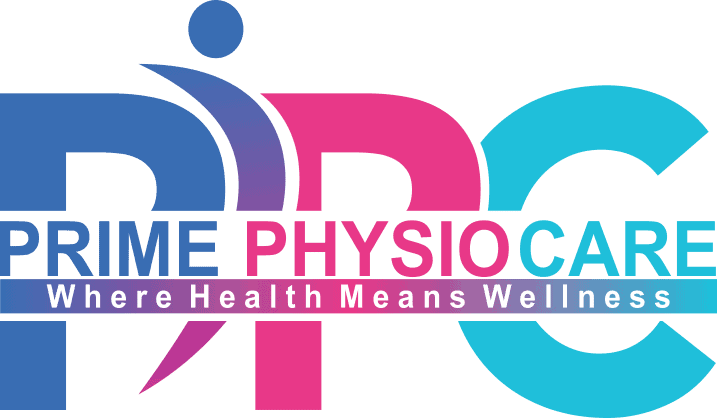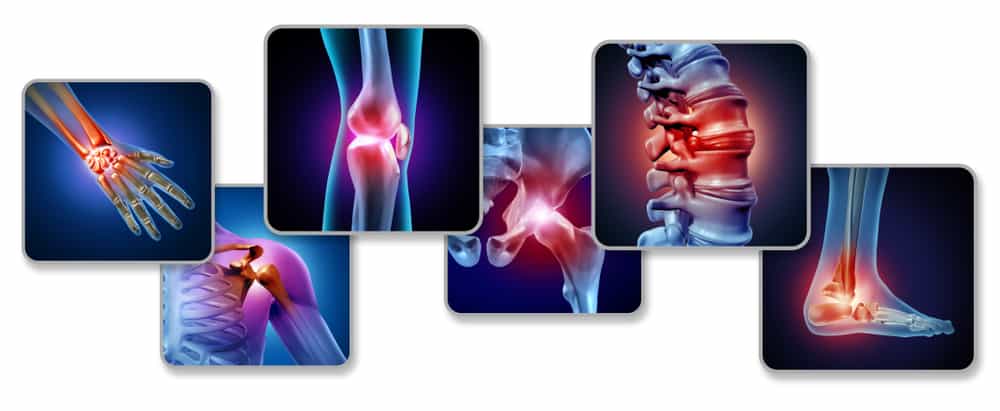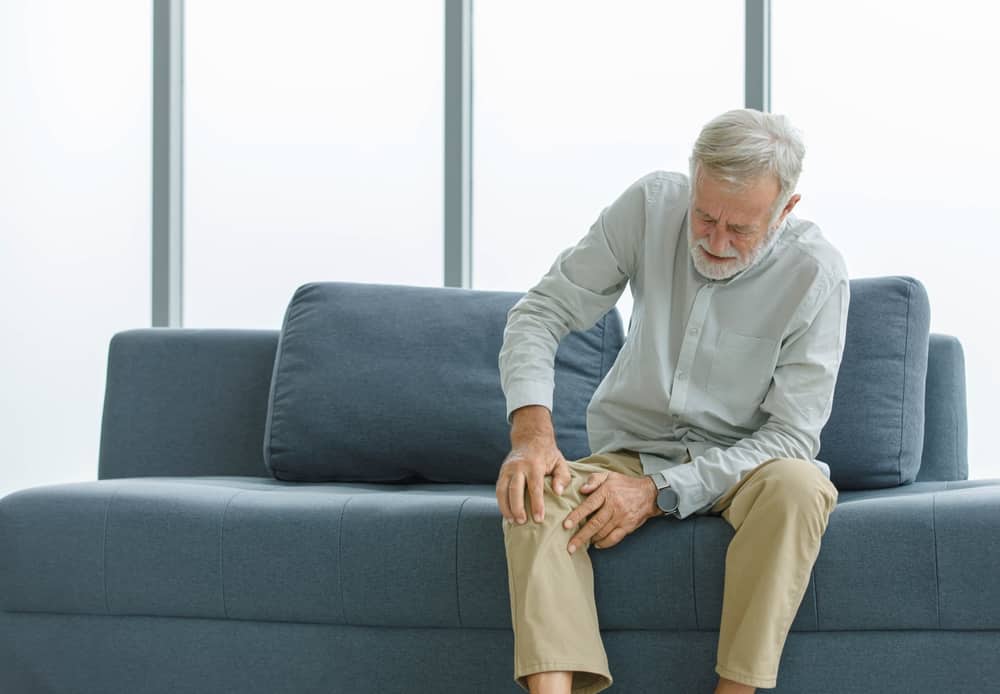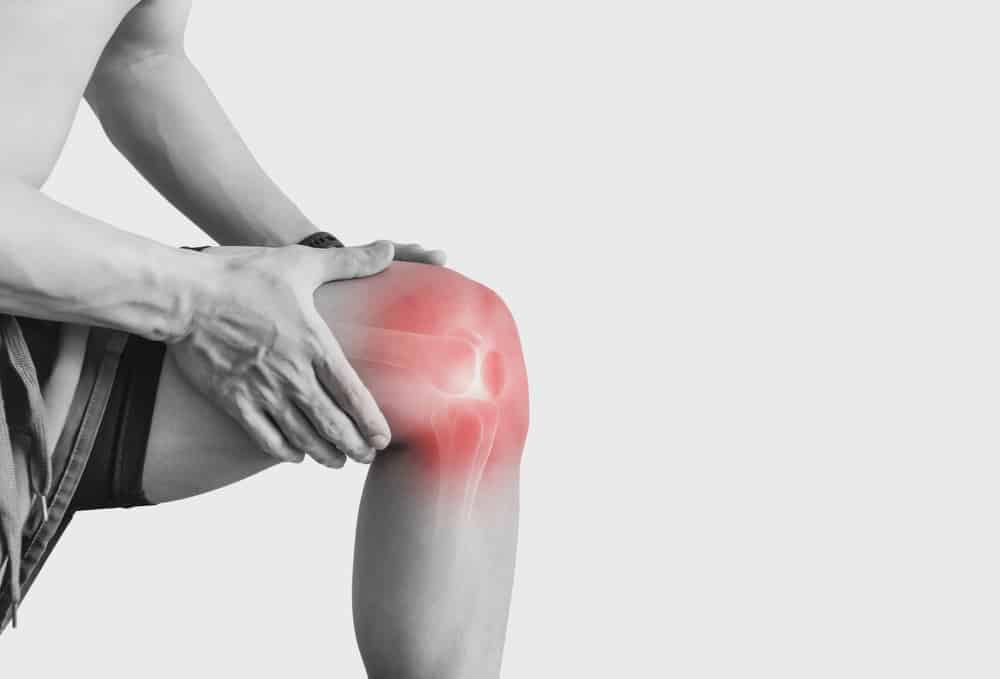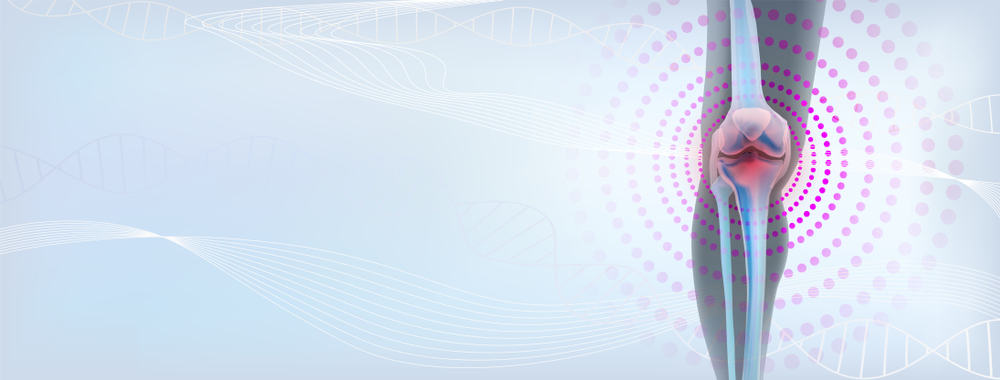What is arthritis?
There are many types of arthritis, including osteoarthritis and rheumatoid arthritis. Osteoarthritis is a condition in which the cartilage that covers the ends of bones wears out, leading to pain and inflammation. Osteoarthritis is a degenerative disease which means it is most common in elderly but it can also happen in young adults.
In younger people, the joints are more flexible because they still have healthy cartilage and an adequate synovial fluid, which is like greasing oil to avoid friction and hence avoid wear and tear.
Rheumatoid arthritis affects the synovial membrane and joint lining, causing inflammation of the joints. It is an auto-immune disease which means that the body starts attacking its own joints.
How many types of arthritis are there ?
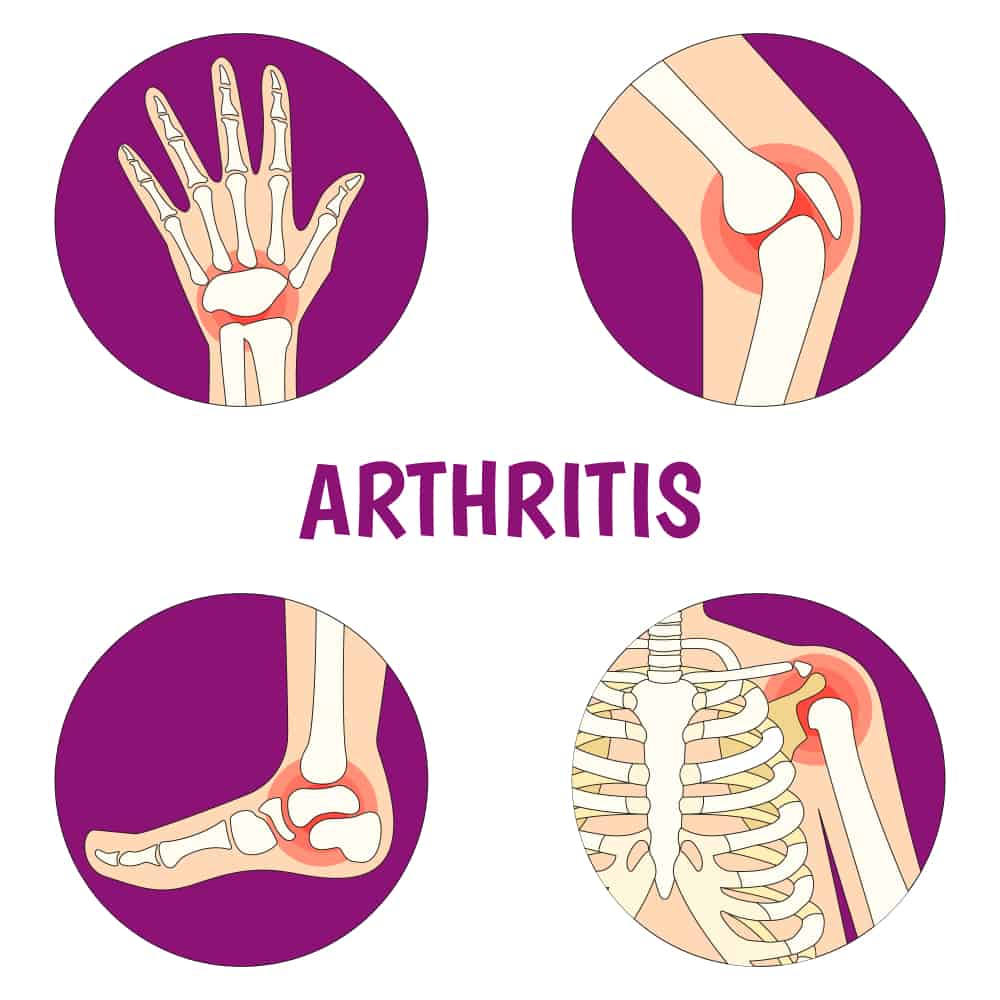
There are three main types of arthritis which are common:
- Osteoarthritis (OA) – caused by wearing out of cartilage between the bones in the joints, often occurring in older people.
- Rheumatoid arthritis (RA) – an autoimmune disease in which the body’s immune system mistakenly attacks the synovial membrane and cartilage, causing pain, swelling, and stiffness in the joints.
- Psoriatic arthritis (PsA) – a form of arthritis that is sometimes called psoriasis arthritis because it can occur along with psoriasis over the joint. Psoriasis is a skin condition in which the skin cells regenerates in 2-4 days instead of a 28 day cycle.
How can physiotherapy help arthritis?
Physiotherapy can help people who have arthritis as well as can be a helpful tool in managing the condition. Physiotherapists can work with patients suffering from arthritis in improving joint movement, which helps reduce pain and stiffness. They can also help people learn new ways to move around more easily and safely, as well as learning home strategies that can help them cope with the symptoms.
People with arthritis can really benefit from physiotherapy, especially if they are experiencing pain and stiffness in their joints.The quality of life can improve drastically with physiotherapy treatment. It is important that you seek out the advice of a physiotherapist if you are experiencing pain, swelling, stiffness in a joint or have been diagnosed with arthritis by a medical professional.
Understanding how arthritis can affect you?
Arthritis is basically inflammation of the joints. It causes pain, stiffness, and swelling in joints. It can also make it difficult for you to move your joints. Arthritis can occur as a result of injury or disease. If you have arthritis, your doctor may recommend treatments such as painkillers, exercises. He or she may recommend you to go to a physiotherapist.
He or she may also tell you to avoid activities that can aggravate your condition. You can manage arthritis very well with the right exercises shown by a physiotherapist, weight control, and taking certain medications.
If you have arthritis, you should try to still stay active and do light exercise every day. You may be able to do gentle walks or other forms of light exercises. If you can’t do these things, you can try stretching exercises or use a walking device. To manage pain you can use a cold pack over the affected joint to help you relax and calm down the inflammation. You can also use an exercise program or therapy designed for people who have arthritis.Pain, swelling and stiffness are common symptoms of arthritis. Pain in joints often comes in waves, with periods of relief or it can be a constant dull aching pain. It is important to keep a diary of the times when you feel pain so that you can identify which movements or activities worsen the symptoms. You will find that certain activities bring on pain. If you have arthritis, it is important to keep track of how your pain changes over time. This will help you learn when pain is likely to get better or worse.You can try some of the following techniques to reduce your arthritis pain. They include taking medicine, heat and cold, stretching, and exercise. Try using them for a few days and then make adjustments until you find what works best for you. Remember to take your arthritis medications as prescribed and to check with your doctor if you have any questions about how to use them.
Managing your pain
Managing your pain in arthritis is a key part of the management. There are a number of things you can do to help reduce your pain and make life more comfortable.
A common complaint from people with arthritis is the inability to sleep at night. If you are one of these people, then keep reading to find why. If You have been experiencing pain in your joints for some time. You might think that your condition is not as serious as it could be. The reality is that arthritis can damage many different parts of your body.
Your joints are probably the most important to look after. You might find yourself unable to get comfortable on your bed at night. It could be a result of several factors. One of the most important factors is the pain that you experience when lying down. If you suffer from arthritis, you know how painful it can be when you lie down. If you feel like this, you need to find ways to reduce your pain so you can sleep well. You might try to use a mattress topper. These are made of foam or memory foam and come in a variety of sizes. They are designed to provide additional comfort when you lie down. You should only use a topper if you have a firm mattress and you are not experiencing any pressure on your joints. Some people prefer to use pillows. These are placed under their knees or around their shoulders. They can be made of a variety of materials, but most are covered with a soft material.
Apart from this there are also some other things that can help you sleep better. For instance you can apply hot or cold packs at the joints before sleeping or applying topical gel for pain. When you suffer from arthritis, you may find it difficult to move your body during the night. This could be due to fatigue that sets in as the body is already suffering from inflammation and on top of it the day’s fatigue.
Having a good night’s sleep is very important in managing arthritis.You should talk to your doctor if you are not sleeping well. He or she might be able to help you find a solution. There are a number of medications available that will help you sleep. They come in different forms and work in different ways. Some of them might make you feel more awake, while others might calm you down. If you are not sleeping well, you need to consider using medication. There are many types of medication you can use. Your doctor can tell you which one will work best for you. The most common drugs that people use to help them sleep are the benzodiazepines. These are known as sedatives. They are also used for anxiety disorders and panic attacks. They have very little effect on your ability to drive. They are not addictive. They can be prescribed by your doctor. If you have been taking them for some time, it is likely that you know how it affects you. If you are concerned about the side effects, you should talk to your doctor about it.
Another type of drug that can help you sleep is called an opioid.It is not for sleeping but it is to treat pain. They are also used in surgery to reduce the risk of post-operative pain. The most commonly used of these are codeine, tramadol and oxycodone. You should only take these for a short time. If you take them too long, they can be addictive. You should speak to your doctor about using these medications.
There are other things you can do to manage your pain in arthritis, as mentioned above. If you are experiencing problems sleeping at night, you need to find a way to deal with this.Its a trial and error way to find out what makes you sleep better at night. For some people exercising can help them relax and hence go to sleep. Consulting with your doctor before starting any exercise program can help you to choose what is best for you.They will be able to tell you if it is safe for you. You should also keep your weight under control. This can help you to stay fit and healthy. You need to make sure that you are getting enough food and water. Not getting enough sleep will make you more likely to experience pain.
Some of the other things you can use to help you reduce your pain include massage. You can also use aromatherapy oils. These are made from various herbs and plants. You can use them in the bath, in the shower or in the bedroom. There are many different ways you can manage your pain in arthritis. You need to find what works best for you. You should also consider using a variety of different therapies. There are several types of therapy that you can try. They include physical therapy, chiropractic care, acupuncture and massage. You should only use these if they are recommended by your doctor.
So to summarize so far in this article is that in arthritis management you need to make sure that you are getting enough rest. It is also important that you are exercising regularly. This will help you to stay fit and healthy. You also need to manage your weight. This will help you reduce the pressure on your joints. You should speak to your doctor about this. He or she will be able to give you advice and suggestions. You should also try to manage your pain using over-the-counter medications. Apart from medicines you can use cold or hot packs for the pain or topical anti pain gel.
Complementary Therapies
What are the complementary Therapies for arthritis? There is no one-size-fits-all answer to this question, as the best complementary therapies for arthritis will vary depending on the individual’s specific symptoms and medical history.
There are several complementary therapies that have been found to be helpful for some forms of arthritis. Many of these therapies have been used successfully by patients for decades, and most of them are relatively safe. Part of complementary therapy is the Alternative medicine approaches that have been used for thousands of years, such as herbal medicines, physiotherapy and acupuncture.
Also, there are other non-traditional approaches that are considered alternative medicine, but which have only recently begun to receive scientific investigation, such as homeopathy and aromatherapy. It is important to note that all of these approaches have been shown in scientific studies to be effective in treating certain types of arthritis. However, their effectiveness with respect to other types of arthritis remains unproven, and many patients have reported that they were not effective. Thus, it is prudent to discuss these therapies with your doctor before using them.
Alternative Medicine Approaches Herbal medicines.Most herbal medicines are considered to be safe when used appropriately, although there are some potential risks. Herbal medicines can be found at health food stores and natural food stores, or you can contact a reputable herbalist for advice on selecting the right product. Herbal medicines may contain a variety of different herbs with medicinal properties.
Occupational Therapy for Arthritis
Occupational therapy can help people with arthritis by providing them with helpful tasks and activities to do. Occupational therapists may recommend things like using a wheelchair, different exercises and using crutches.
Most of the time arthritis can be managed, and it can’t be cured completely. However, there are many ways to manage arthritis, such as taking medications, wearing braces, and getting physiotherapy. There is no cure for arthritis, but there are ways to manage it.
Why do you need physiotherapy for arthritis?
Physiotherapy for arthritis can really help with the inflammation, pain and stiffness.In physiotherapy there are several different types of therapies for people with arthritis, including exercise, manual therapies, acupuncture and hydrotherapy. To manage inflammation electrotherapy modalities might be used.
The type of therapy that is most appropriate depends on the person’s condition, their age, and whether they have other health conditions. Manual therapy can help relieve joint pain. It is possible that it will help to improve muscle strength and flexibility. There are a variety of manual therapies available.
They include:
-Acupuncture
-Electrotherapy
-Kinesiotaping
-Manipulation
-Soft tissue mobilisation
-Massage
-Physiotherapy
For people with arthritis, physical therapy or physiotherapy can be helpful in managing pain and improving mobility. Physiotherapy may also be recommended if you have a health condition such as osteoporosis or spinal problems. If you are taking medications for your arthritis, make sure you tell your physiotherapist about all the medications you are taking. People with arthritis should do exercises that are prescribed by the physiotherapist . It will help their joints move properly. Exercises will help improve strength and flexibility. It is important to do exercises that are appropriate for your condition. You may need to start with simple exercises. You may need to use aids such as braces, cushions, or splints to help you move better. Your Physiotherapist will tell you which exercises are right for you.
If you want to make the quality of your life better, it is best to see a physiotherapist. in order to relieve joint pain and slow down the progression of osteoarthritis.
Physical therapy can help you:
- Strengthen your muscles around your joint to help support it and reduce pain.
- Modify your workout routine to increase your flexibility and range of motion.
A physiotherapist will use heat, massage, ice or electrical stimulation to increase circulation and relax the muscles and joints. After that he or she will prescribe strengthening exercises or stretching exercises depending on the condition of the arthritis.
Following are the best tips for arthritis and its care
- Keep a regular exercise routine. This can help to improve your overall health and wellbeing, and may help to relieve some of the symptoms of arthritis.
- Eat a balanced and healthy diet. This will help to maintain your general health and may help to reduce the symptoms of arthritis.
- Take regular breaks from strenuous activity. This will help to avoid overuse injuries and may help to improve your overall health.
- Drink plenty of fluids. This will help to reduce swelling and pain, and will also help to improve your overall well-being.
- If you have problems with pain, try taking painkillers such as paracetamol (Nurofen, Panadeine or Panadol) or aspirin. These can help to relieve the pain caused by arthritis.
- 6.Pain can also be managed by cold or hot packs and topical gels.
- If you think that you are not sleeping properly, talk to your doctor about it.
- If you are concerned about your weight, speak to your GP. It may be possible to lose weight and keep it off, which could reduce some of the symptoms of arthritis.
- Avoid smoking and drinking.
- If you feel you are slipping in depression then immediately speak to your doctor about it. Depression is very common in people with arthritis, and it can make symptoms worse.
- Make sure that you have someone who will help you with housework and other daily activities, and make sure that they have plenty of rest.
- Ask your doctor about how you can manage your pain. There are many ways to relieve the pain, such as taking painkillers or having injections.
Arthritis basically is inflammation of the joints. It is a condition that affects more than 2 million people in the UK. Above points can help in managing it.
Find a best physio for arthritis
If you are experiencing arthritis, you may want to seek out a physio to help you manage the condition. As mentioned earlier and highlighted the importance of physiotherapy in arthritis a physiotherapist can help to improve your flexibility, range of motion, and strength, which can help to reduce the pain and stiffness that can be associated with arthritis.
We at Prime Physio Care aim to see you within 24 hours so contact us to make an appointment or to find out more information on how we can help you, please call us on 07515280990 or email us primephysiocareluton@gmail.com. We are one of the best clinics whose physios are registered with HCPC, CSP and Physio first as well have enormous experience.
